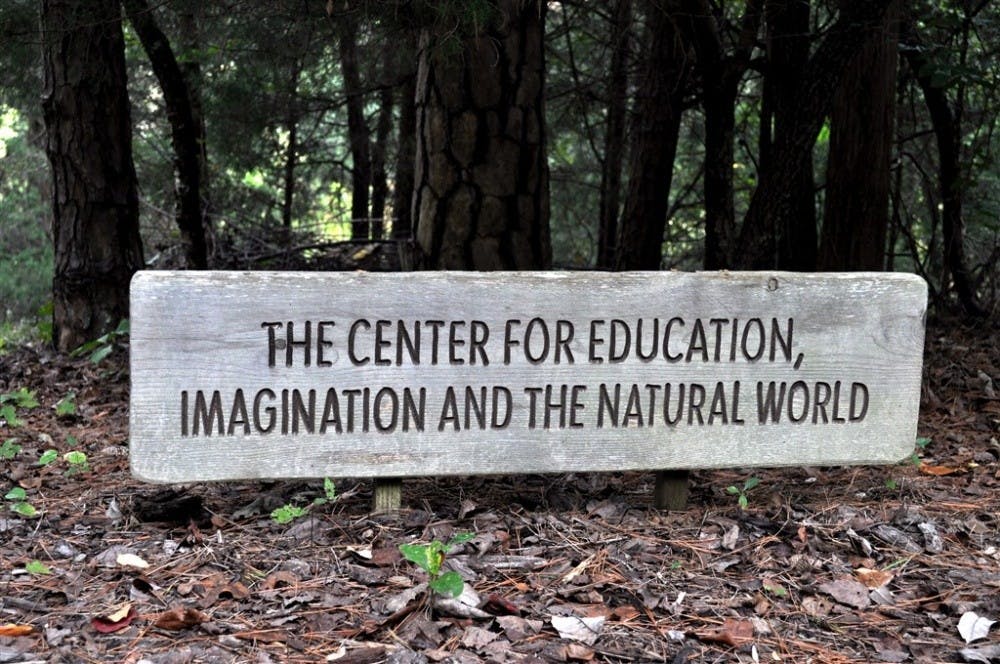The Center for Education, Imagination and the Natural World hopes to reconnect children with nature, and get them away from technology for a little while. Photo by Merissa Blitz.
Summer weeds have grown over the annual flower beds. The persimmon tree is blooming with an abundance of its orange fruits, the bright autumn sun dancing through its green leaves. Winter crops of spinach and kale will soon replace the weeds that have learned to call that specific patch of soil their home. Volunteers dig through the dirt to rejuvenate the garden. Everything at Timberlake Farm is still, silent and at peace. There are no distractions, no technology — just people engulfed in the sacredness of nature.
The garden is one of many areas on Timberlake Farm's 165-acre plot of land that the Center for Education, Imagination and the Natural World uses for its youth programs. Its goal is to reconnect children with the beauty, wonder and intimacy of the natural world, using five miles of trails, 22 boardwalks and footbridges, creeks and ponds along with its many pastures, meadows, orchards and deep woods.
Timberlake Farm, a non-profit organization, has been a private family residence for 40 years.
"Over time, the property became a place of love and an honoring of the sacred," said Sandy Bisdee, director of the children's programs.
She said the center is an earth sanctuary. Everything is allowed to live and everything has a place to be safe.
Bisdee emphasizes that the center is not an environmental education center but is an eco-contemplative center to reflect on the sacred aspect of nature.
"We don't teach," she said. "It's about experiencing what an earth sanctuary is."
Bisdee wants the children, primarily students ranging from kindergarten to eighth grade, to feel they can turn to nature for solace and that nature is a healing place.
"There's a growing separation between children and nature," Bisdee said.
In today's society, there are things that are keeping children indoors, such as video games or an unsafe neighborhood.
But when the children come to the center, they practice different methods of applying sight, smell and hearing senses. A group of 24 students is separated into three smaller groups and these groups take nature walks, where they walk in silence.
"It is a time to tune in to nature with their senses and is a wonderful experience for them," Bisdee said.
It takes the help of many people to run the non-profit. There are only three paid staff members who work at the center: Bisdee, director Peggy Whalen-Levitt and business manager Rory Bradley. Others who help with the upkeep of the garden are volunteers.
The center gets about 30 to 50 volunteers to help per semester. Many groups come from Elon University, including the service fraternity, Alpha Phi Omega, The Green Team, the men's track team and the sociology club. Other students from Guilford College and the University of North Carolina in Greensboro also come to volunteer.
Lauren Remenick, a senior environmental science and psychology double major, interns at the garden.
"I pretty much tend to the garden, as sort of like a behind-the-scenes when the children aren't there," she said.
Remenick works in the garden about five days a week but this is the only time spends in nature.
"I do like to run, but I haven't found any running trails around Elon, so I mostly run on the side of the road, which I wouldn't exactly call nature," Remenick said.
The life of a college student is hectic and, in Remenick's experience, it comes with a lot of drama and craziness. She likes her time alone and working at the garden brings her peace and quiet.
"It's nice to hear the trees rustle in the wind and hear the birds chirping," she said. "It's also a lot of fun getting to see the different types of plants that you usually don't come into contact with, as well as several different insects."
Bisdee feels that humans are at a time in history where the earth needs a new story. She also believes that children are more likely to grow up and care about nature if they have the chance to fall in love with the earth.
Remenick, like Bisdee, believes that technology is one of the main reasons why people don't appreciate nature enough, but she said that's not the only reason.
"We as a society don't go out into nature that much, especially college kids," Remenick said. "We go to bars, restaurants, school, the library, our house and maybe play a sport outside, but even that isn't technically nature. I think people have gotten too high strung and too busy for the calm of nature."
Children of the Forest, an after-school program, visited the center to experience the earth sanctuary. A television reporter had been there that day filming a documentary. The reporter asked the children, "What do you get out of this program?"
Bisdee said that most of the children, who were all around eight years of age, didn't know what to say. She was surprised when one girl spoke up and replied, "I feel like I'm all back together again."
It was exactly what Bisdee wanted to hear.
"I felt fulfilled," Bisdee said, "It was a confirmation that this is what the world needs right now, this is what children need right now."


